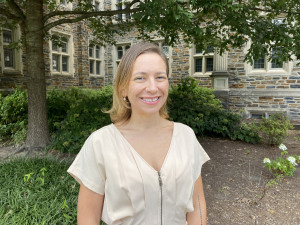“Be Curious, Question, Explore:” Advice for First-Year Students Navigating Constellations

“Which Constellations interest me the most?”
This is the question incoming students are likely asking themselves until June 17, the deadline for submitting preferences for Constellations.
Constellations are an integral part of the signature First-Year Experience in the new Arts & Sciences curriculum. Beginning this fall, incoming Trinity undergraduates will kickstart their Duke journey with a cohort-based, interdisciplinary First-Year Experience as part of a Constellations cohort or through the FOCUS program.
While applications for FOCUS closed on May 25, students who will fulfill their First-Year Experience through Constellations have until June 17 to indicate six preferences from the 16 Constellations offered.
Faculty and staff will carefully review all the preferences submitted and match each student to a Constellation. Matches will be announced on July 7, with every effort being made to place students in one of their identified Constellations.
With so many good choices, how can students request the Constellations that are best for them? We asked Deborah Reisinger, Dean of Undergraduate Education in Trinity College of Arts & Sciences, and Michael Domeracki, Director of Constellations, for their advice.
Much More Than a Topic
As students consider the variety of Constellation topics offered, Reisinger encourages them to ask themselves: “What kinds of problems do I want to think about? What issues feel urgent — or compelling — to me?”
“What I think is so cool about Constellations is that students are given an interdisciplinary space to explore a question and see how researchers from different fields can share the same curiosity,” said Domeracki.
Constellations offer not only academic content but also a cohort of peers and faculty who are excited to explore these ideas together. “There’s no wrong choice,” Reisinger stressed. “Every Constellation invites big questions and fresh ways of thinking.”
Step Outside of the Planned Path
As you’re mapping your Duke journey, remember that even if you have a career in mind with a clear path to follow, there are lots of interesting side roads worth exploring. Constellations present the opportunity to gain new interests and expand existing ones.
“Exploring disciplines beyond a chosen trajectory builds flexibility, creativity and critical thinking — qualities that are essential for any career, but most importantly, for a well-lived life,” said Reisinger. “The world’s most pressing problems don’t come neatly packaged by major; neither do the most innovative solutions. For example, a future doctor will gain perspective through a course on storytelling and an aspiring economist will gain insight through a course on ethics.”
“Majors at Duke are structured in such a way to not only allow, but encourage, exploration into new academic arenas, curiosities and questions,” said Domeracki. “As you consider your Constellations, give yourself the liberty to follow that curiosity, that weird class, that really intimidating subject, that thing you didn't even know you could study.”
Reisinger agreed, stressing, “When selecting Constellations, students should consider both their current interests and areas they might be curious to explore. We really hope that students step outside their planned path to try something new.”
Be Thoughtful, but Bold
Domeracki noted the care faculty have invested in the process of designing Constellations. “This was such a thoughtful endeavor, and we want to replicate that care in the matching process. The Constellation Matching Form — emailed to incoming first-year students on June 4 — is going to guide us as we do our best to match students to their interests, so please be thoughtful in your selections.”
But, he added, “Also, take the risk, be bold! You'll graduate with a degree and be prepared for your career. Trust us, it'll happen. But don't forget the joy along the way.”








